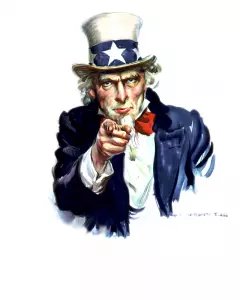
Uncle Sam Points at Drunk Drivers
Depending on the facts of your case, it may indeed be possible to drive drunk, damage your car and then write the whole thing off on your tax return.
The caption for the interesting and unusual case that stands for this proposition is:
JUSTIN M. ROHRS, Petitioner v.
COMMISSIONER OF INTERNAL REVENUE, Respondent
Docket No. 14109-08S.
This opinion was filed December 10, 2009. The facts are as follows:
On August 12, 2005, petitioner purchased a 2006 Ford F-350 pickup truck for $40,210.65. On October 28, 2005, petitioner attended a gathering at a friend’s house. Anticipating that he would be drinking alcohol, he arranged for transportation to and from his home. After returning home petitioner decided to drive to his parents’ house. On the way there he failed to successfully negotiate a turn, and his truck slid off an embankment. The truck rolled over and was severely damaged. Because his blood-alcohol level was 0.09 percent, he was cited and arrested for driving under the influence of alcohol (DUI).
The legal threshold for blood-alcohol level in the State of California is 0.08 percent. He was then taken to the hospital. Petitioner’s loss claim filed with his automobile insurance carrier was denied in accordance with the terms of his policy because of his DUI citation and arrest. On April 13, 2006, petitioner filed his 2005 Form 1040, U.S. Individual Income Tax Return. On that return he claimed a $33,629 casualty loss deduction for the damage to his truck. The issue for the court to determine was whether or not the petitioner was grossly negligent or just simply negligent, because if the driving drunk and the car crash was “grossly negligent” the deduction would have been denied.
In making their determination the court found that at the time of the accident petitioner’s blood-alcohol level was 0.09 percent, which is slightly over California’s legal limit of 0.08 percent. See Cal. Veh. Code sec. 23152 (West 2000). Further and significantly distinguishing petitioner’s situation from that in People v. Bennett, supra, petitioner made arrangements not to drive immediately after consuming alcohol. He arranged for transportation home and thus allowed some time for his body to process the alcohol before driving. If petitioner truly did not care what happened, he would not have gone to the trouble to arrange for transportation. Likewise, there is no evidence in the record that petitioner was aware his actions would result in injury. In addition, there was no evidence that excess speed or alcohol directly caused petitioner’s accident.
Where the taxpayer is reasonably unaware that he is doing something wrong, it is less likely that allowance of a casualty loss deduction would so severely frustrate public policy as to require disallowance.
In reaching our decision, we do not reflect upon or in any way condone the act of driving under the influence of alcohol. It is our obligation to decide whether petitioner’s actions amounted to gross or willful negligence and/or whether the allowance of a casualty loss deduction in the setting of this Federal income tax case would frustrate public policy.
We hold that petitioner is entitled to the claimed casualty loss deduction and, accordingly, is not liable for the section 6662(a) accuracy-related penalty.
The opinion does state, in bold letters:
PURSUANT TO INTERNAL REVENUE CODE SECTION 7463(b),THIS OPINION MAY NOT BE TREATED AS PRECEDENT FOR ANY OTHER CASE.
Nevertheless, it is interesting to find that in this one case at least, the drunk driver was able to write-off their accident.
{ 1 comment… read it below or add one }
I don’t understand why the insurance company didn’t pay, assuming there was a lien on the vehicle, wouldn’t the lending bank require an insurance policy that pays no matter what happens, even a DUI?
Reply
{ 1 trackback }